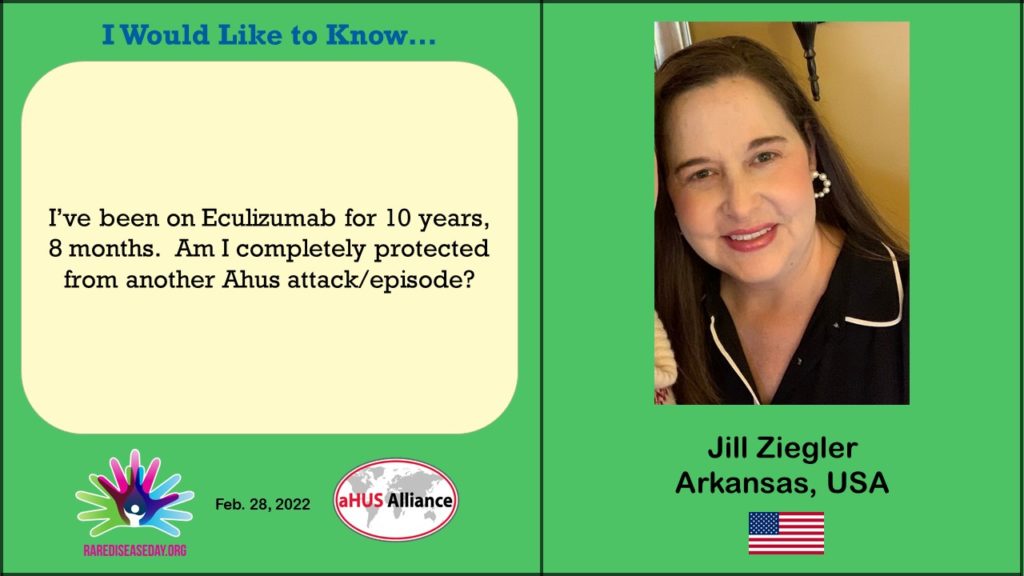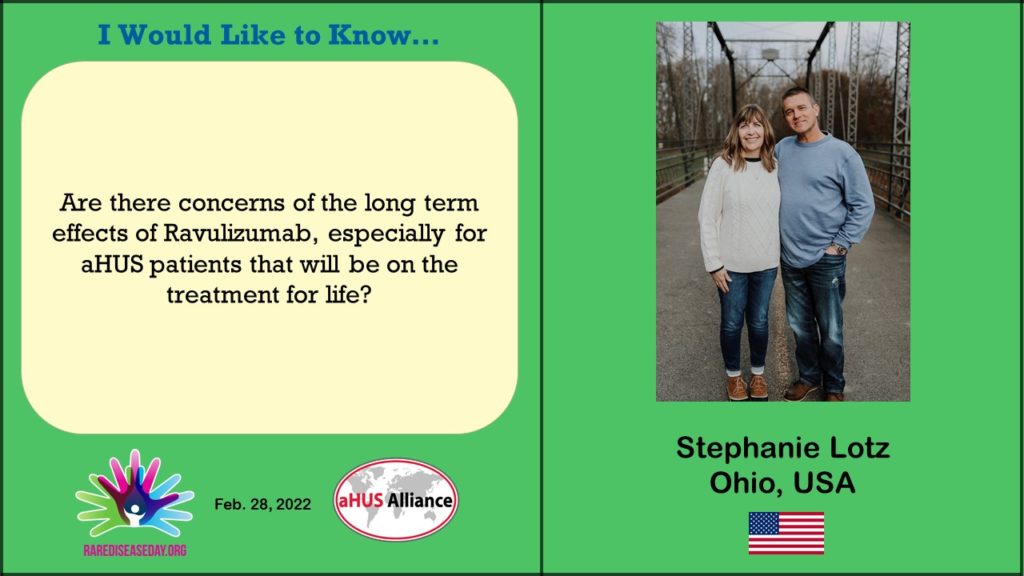Eculizumab was approved by the US Food and Drugs Administration for PNH for 15 years ago on 16 March. This September coming, it will be 11 years since the FDA approved the drug for the treatment of aHUS.

So Jill, you have been on eculizumab treatment for as long as it has been approved for aHUS in the USA, perhaps a shade longer.
Back then it was claimed that patients would need it to treat aHUS for life. That had been the claim for PNH patients too, but it is a different disease. It is not likely that PNH will spontaneously resolve itself. aHUS is not like that. Patients circumstances can change.
Eculizumab blocks the C5 component of the Complement system. That stops aHUS in its tracks.
There is a “missense” mutation (c.2654G→A) in some patient’s C5 that prevents eculizumab doing its job. It cannot stick to C5 as it needs to. If you had that mutation , Jill , It would not have worked from the start of your treatment. So unless the amount of drug in your body will at some drop below the trough level that Alexion has calculated as needed to prevent any breakthrough hemolysis, a new aHUS thrombotic microangiopathy (TMA) is prevented. Indeed some have found that there is considerable safety margin level in Alexion’s calculations for a breakthrough to happen.
This has not been the case for PNH patients. Prescribed dose levels have not proven enough for some long term PNH patients to prevent haemolysis break through. As a result they need to have blood transfusions.Transfusion were no longer meant to be needed once PNH patients were on eculizumab treatment. So off label higher dose levels have had to be prescribed for those PNH patients. Ravulizumab dose levels for PNH patients are higher than for eculizumab and it is expected to address that problem.
If anything for aHUS treatment, some patients have had their eculizumab dose levels reduced.
Doses have been tapered and infusion intervals extended without those patients experiencing an aHUS breakthrough.
Though some times, for example in pregnancy or hemapoietic stem cell bone marrow transplants aHUS , higher doses or more frequent infusion intervals have been needed temporarily to stop and prevent aHUS breakthrough.
As with all drugs like eculizumab, it is possible that in time the immune sysytem can develop anti drug antibodies to stop a treatment working. In the early days this was a concern for eculizumab treatment. This is known as immunogenicity. And its efficacy might drop.
Although such antibodies have been found in a small number of PNH and aHUS patients who were part of an immunogenicity trial in 2016 (each with around 6 years of eculizumab experience). These antibodies were considered to be transient and to have minimal impact on eculizumab’s effectiveness.
So Jill , if you are among those patients who will need eculizumab for life, there is nothing to suggest that it will not continue to work as it has done for you for nearly eleven years.
The question that you ask, Stephanie, may well have been on Jill’s mind when she began eculizumab treatment, The same concerns apply to Ravulizumab. Will dose levels always be sufficient enough to prevent aHUS breakthrough and could there be a possible immunogenicity impact?.There is no hint in Jill’s case that a complement inhibitor has had any long term effect which she now regrets, just hope that it continues to do its job as it has done
Some patients will need to be treated for life. They may not always be on the same treatment though, Stephanie.

Article No. 490


I truly appreciate the question and the answer.